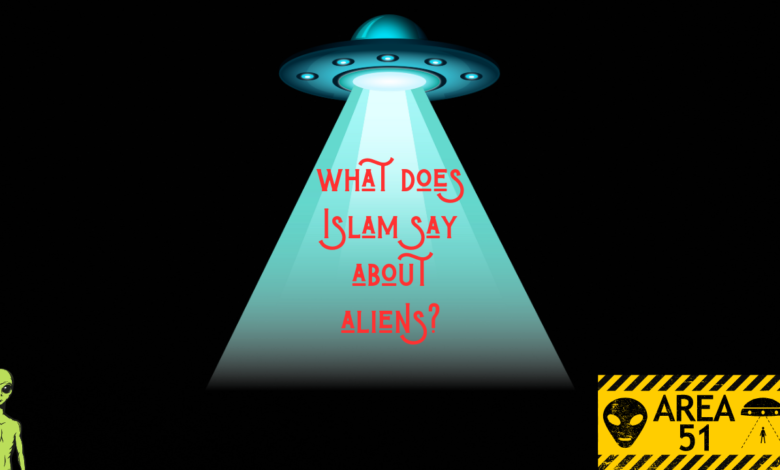what does Islam say about aliens?

Introduction
The question of extraterrestrial life has captivated human imagination for centuries, sparking curiosity about the possibility of intelligent beings beyond Earth. Islam, as one of the world’s major religions, offers a unique perspective on this topic. While the Quran and Islamic teachings do not directly address the existence of aliens, scholars and believers have engaged in thoughtful discussions to interpret the potential implications of extraterrestrial life within the framework of Islamic teachings.
The Quranic Framework
The Quran, the holy book of Islam, does not explicitly mention the existence of beings beyond Earth. However, it does emphasize the vastness and diversity of creation. Verses like “And among His signs is the creation of the heavens and the earth, and the variations in your languages and your colors: verily in that are signs for those who know” (Quran 30:22) highlight the notion of diverse creations by God.
This diversity in creation is often interpreted by scholars as indicative of the potential for life to exist elsewhere in the universe. The Quran emphasizes God’s creative power and ability to bring forth life in various forms. Therefore, some Muslims believe that the existence of extraterrestrial life could be consistent with Islamic teachings, as long as these beings are part of God’s overall creation.
Intellectual Curiosity and Seeking Knowledge
Islam encourages believers to explore and understand the world around them. The pursuit of knowledge and discovery is highly valued, as demonstrated by the saying of the Prophet Muhammad (peace be upon him): “Seeking knowledge is obligatory upon every Muslim.” This principle applies to all fields of knowledge, including the possibility of extraterrestrial life.
Islamic scholars, over the centuries, have grappled with the question of whether other inhabited worlds could exist. Some scholars have argued that the existence of life on other planets is possible within the bounds of Islam, as long as this belief does not contradict core theological principles.
Ethical and Spiritual Considerations
If evidence of extraterrestrial life were to emerge, Muslims would likely engage in a thoughtful analysis of the ethical and spiritual implications. Islam places a strong emphasis on the unity of God’s creation and the interconnectedness of all living beings. If intelligent alien life were discovered, it might lead to discussions about the shared ethical responsibilities among different forms of life and the potential for mutual cooperation and understanding.
Additionally, the existence of intelligent beings beyond Earth might raise questions about the role of prophets and divine messages in their societies. Islamic teachings affirm the concept of prophethood and divine guidance, which could potentially lead to inquiries about whether these beings received similar guidance or if they had their own spiritual journeys.
Balancing Faith and Science
Islam has a history of fostering an environment where faith and science can coexist. The pursuit of knowledge through observation, experimentation, and rational thinking is seen as a means of better understanding God’s creation. The discovery of extraterrestrial life, if it were to occur, could be seen as an opportunity to further appreciate the complexity and magnificence of God’s design.
It’s important to note that individual interpretations of Islamic teachings may vary. Some Muslims might be more cautious about accepting the existence of extraterrestrial life due to concerns about theological implications, while others may embrace the idea as a manifestation of God’s limitless creativity.
In conclusion, while Islam’s holy texts do not explicitly address the existence of aliens, the religion’s emphasis on diversity in creation, pursuit of knowledge, and ethical considerations provides a framework within which Muslims can engage with the concept of extraterrestrial life. Islam’s open-minded approach to understanding the universe allows for a respectful and thoughtful exploration of the unknown, ensuring that faith and reason can harmoniously coexist.
FAQs: What Does Islam Say About Aliens?
Are there any references to extraterrestrial life in Islamic scriptures?
There are no direct references to extraterrestrial life in the Quran or Hadith (sayings and actions of Prophet Muhammad). However, some scholars interpret certain verses and hadiths to suggest the possibility of other creations beyond Earth.
Does Islam deny the existence of aliens?
No, Islam does not explicitly deny the existence of aliens or other forms of life in the universe. The Quran emphasizes the vastness of creation and God’s power to create beyond human comprehension.
How does Islam view the idea of extraterrestrial beings?
Islam encourages believers to reflect on the signs of God’s creation in the universe. The existence of other intelligent beings could be seen as another manifestation of God’s infinite creativity and wisdom.
Would the discovery of extraterrestrial life conflict with Islamic beliefs?
The discovery of extraterrestrial life wouldn’t necessarily conflict with Islamic beliefs. Islam promotes seeking knowledge and understanding the world around us, so such a discovery could be seen as a testament to the greatness of God’s creation.
Could aliens have their own prophets or religions according to Islam?
Islam teaches that prophets were sent to every nation throughout history. It’s theoretically possible that other beings on other planets could have received their own prophets, but there is no explicit mention of this in Islamic sources.
How would the existence of aliens affect the concept of Adam and Eve?
The existence of aliens would not necessarily impact the concept of Adam and Eve, as they are central figures in the narrative of human creation and spiritual history. Islamic scholars might interpret these stories allegorically or in a way that accommodates the new information.






